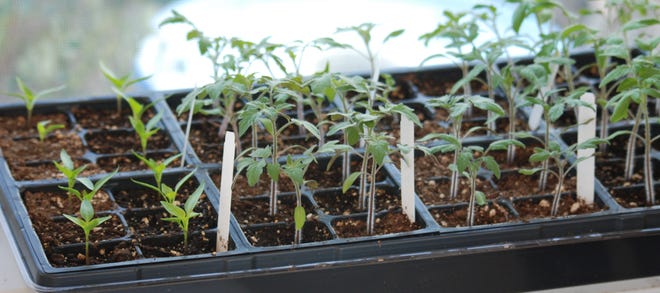
For many vegetable gardeners, this is perhaps the best season of the year—seed catalog season! Since the first week of January, colorful seed catalogs have begun to appear in my mailbox just as links to online seed catalogs have appeared in my email inbox.
For a vegetable gardener in Greater Columbus, nothing provides more satisfaction on a cold snowy or rainy day in January than perusing colorful seed catalogs and dreaming about growing your best vegetable garden ever just a few short months from now.
Gardening:Pruning trees now can help prevent oak wilt
Many vegetable gardeners get a jump on the growing season by starting their own seeds indoors, and January is the time to begin making plans for ordering seeds and other needed supplies.
Benefits of growing your own seedlings
There are many benefits to starting vegetable seeds indoors, but the ability to select a wider range of different varieties of crops is tops on the list of benefits for me. If you purchase seedlings at the garden center later in the season, few varieties of specific crops are typically available.
Urban farming on the upswing in Columbus area
Selecting seeds to grow indoors
While starting seeds indoors offers many benefits to gardeners, not every seed should be started indoors. Some vegetable crops grow best when they are directly sown in the soil outdoors. Before you start your seeds, it’s best to understand which seeds should be started indoors and transplanted into the garden.
Brussels sprouts, eggplant, kale, lettuce, greens, onions, okra, peppers, and tomatoes. Broccoli, cauliflower and cabbage seeds actually are more easily started indoors and transplanted into the garden as seedlings than direct seeded outdoors in the garden.
Some seeds that can be a little more difficult to successfully seed indoors include celery, chard, cucumber, melon, pumpkin, spinach, and squash. Vegetables such as bean, beets, carrots, corn, and peas should be direct seeded in the garden as the roots can be disturbed during transplanting, and plant growth can be hindered.
warm season crops such as pepper, eggplant, tomato, cucumber, squash, and others should be seeded indoors approximately 6-8 weeks before the last frost, which typically occurs close to May 1 in Greater Columbus. Cool season crops such as onions, Brussels sprouts, cabbage, cauliflower, and lettuce can be seeded indoors as early as February as these crops can be transplanted into the garden before the last frost, depending upon soil conditions.
Resist the temptation to start seeds indoors too early, as seedlings may become root-bound before you transplant them into the garden, and it can be more difficult to harden off or acclimate larger seedlings to the outdoor environment in early spring.
Gardening:Tips to protect trees and shrubs this winter so they’ll spring back next year
hogan.1@osu.edu
Source: dispatch.com
Leave a Reply Cancel reply